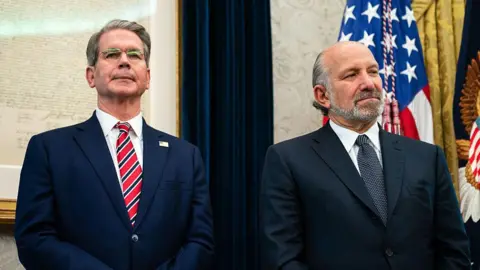Trump's tariffs 'not going away' as deadline for deals looms, top adviser says
 Getty Images
Getty ImagesUS President Donald Trump is not planning to extend the pause to his sweeping global tariffs, Commerce Secretary Howard Lutnick said.
The president's plan - where countries face between 11% to more than 100% tariffs on goods brought into the US - was announced in April. But the majority of the tariffs were paused by Trump for 90 days in the wake of stock market volatility.
Speaking with Fox News, Lutnick said he expects the President to stand firm when that 90 day pause expires at the start of July.
A key trade deal would be with China, who US Treasury Secretary Scott Bessent said has "not been a reliable partner" and claimed it was holding back products in the global supply chain.
The president's top trade advisers presented a united front in their appearances on separate US morning television programmes on Sunday.
They remained steadfast on the tariff agenda, which has faced ongoing challenges in the nation's court system.
"Tariffs are not going away," Lutnick said in response to the court cases.
He added that the US "could sign lots of deals now" but the Trump administration is working to "make them better".
"You're going to see over the next couple of weeks, really, first class deals for the American worker," he said..
And on the expiration of the 90 day pause, Lutnick said: "I think that's the deadline, and the President's just going to determine what rates people have if they can't get a deal done".
When the pause expires, in theory it would enact sweeping tariffs on countries across the globe.
Imports from about 60 trading partners that the White House has described as the "worst offenders", including the European Union, Vietnam, South Africa and more, will face higher rates.
Trump has described these taxes as payback for unfair trade policies.
- What tariffs has Trump announced and why?
- US pauses higher tariffs for most countries after market havoc, but hits China harder
On Friday, Trump announced the US will double its current tariff rate on steel and aluminium imports from 25% to 50%, beginning on Wednesday.
Like with most of the announced tariffs, Trump said the move would help boost local steel industry, while reducing US reliance on China.
US steel manufacturing has decreased in recent years and countries like China, India and Japan have become the world's biggest producers.
The steel tariffs come as many hold their breath waiting for further announcements. from the Trump administration.
Trump's tariff policies have upended global trade and cracks have formed - or widened - among relationships between the US and other countries, including some of its closest partners.
World watches for news of US-China trade deal
The levies have worsened relations between China and the US, the two largest global economies - and launched the countries into a tit-for-tat trade battle.
Under a trade truce struck in May at Geneva, the US lowered tariffs imposed on goods from China from 145% to 30%. China's retaliatory tariffs on US goods dropped from 125% to 10%.
But a larger trade deal between the countries has not been established.
On Sunday, Treasury Secretary Bessent told CBS News, the BBC's US news partner, details of the trade will be "ironed out" once Chinese President Xi Jinping and Trump speak, but he did not say exactly when that conversation is expected.
"What China is doing is they are holding back products that are essential for the industrial supply chains of India, of Europe. And that is not what a reliable partner does," Bessent said.
The Treasury Secretary claimed China could be withholding some products because of a "glitch", or he said it could be "intentional" - but the administration would not know for sure until a call with both countries happened.
On Friday, China urged the US to "immediately correct its erroneous actions, cease discriminatory restrictions against China and jointly uphold the consensus reached at the high-level talks in Geneva".
White House National Economic Council Director Kevin Hassett told ABC News on Sunday that Trump and Xi are expected to talk this week, and said "both sides have expressed a willingness to talk".
"The bottom line is that we've got to be ready in case things don't happen the way we want," Hassett said of the expected China talks. "Because if we have cannons without cannonballs, then we can't fight a war."
"We have to have a steel industry that's ready for American defence," he said.
